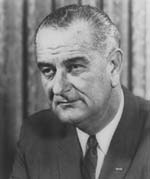
Lyndon Baines JohnsonAugust 27, 1908 � January 22, 1973 36th President of the United States (1963 1969) Johnson succeeded to the office of the president after the assassination of John Kennedy. His terms in office would show him to be the most progressive president for the poor and Black people in the history of the country. His civil rights legislation would also display him to be the friendliest president to Blacks since Abraham Lincoln. He accomplished what has become known as the �Great Society.� This included laws that upheld Medicare, Medicaid civil rights, environmental protection, aid to education, and public broadcasting. He was well known for his forceful personality and his coercion of other politicians to get his way. This trait went a long way toward him getting his Great Society legislation through congress.
CIVIL RIGHTSJohnson overcame southern resistance in convincing the Democratic controlled congress to pass the Civil Rights Act of 1964 put forward by John Kennedy. He and his supporters overcame a great deal of opposition in the Senate, including a Southern Democratic filibuster. Johnson signed in the Kennedy version of the bill, which was revised and made stronger, on July 2, 1964. It is said that upon the signing of the bill then putting down his pen he uttered: �We have lost the South for a generation." He may or may not have said this but it certainly came to pass. In 1965 he achieved a second civil rights bill, the Voting Rights Act which made it against the law to discriminate in voting. This law allowed millions of southern Blacks to vote for the first time in United States history. During the Selma to Montgomery civil rights march Viola Liuzzo from Michigan was murdered a by gunman driving by in a car. Following that murder Johnson announced on television the arrest of four Ku Klux Klansmen involved in her murder. He angrily denounced the Klan as a �hooded society of bigots." He was the first American President to prosecute Klan members since Ulysses S. Grant. He appealed to members of the Christian community for help in his efforts to eradicate bigotry in the country. By doing so he obtained support from churches all over the country for his positions in removing the mood for racist violence. On June 4, 1965 at the Howard University commencement he said: �To shatter forever not only the barriers of law and public practice, but the walls which bound the condition of many by the color of his skin. To dissolve, as best we can, the antique enmities of the heart which diminish the holder, divide the great democracy, and do wrong � great wrong � to the children of God."
WE SHALL OVERCOMEIn 1967 Johnson nominated the noted civil rights attorney Thurgood Marshall to be the first African American Associate Justice of the United States Supreme Court. |